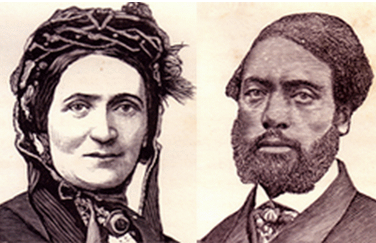Escaping Slavery Is Not Enough
Ilyon Woo’s tale of the Crafts’ daring decampment has the vigor of a thriller. This biography deserves many of the accolades that it has enjoyed, but it could have been even more powerful.

‘Master Slave Husband Wife: An Epic Journey from Slavery to Freedom’
By Ilyon Woo
Simon & Schuster, 416 pages
Ellen and William Craft, their white masters might have said, had it easy. Ellen, who could pass for white, was good with a needle and treasured as a valuable house slave. The reliable William, trained to build furniture, was so trusted that he could be loaned out to other slaveholders and work on his own.
Neither Ellen nor William could read or write and, like all slaves, they were subject to their masters’ whims — which, in Ellen’s case, often meant cruel treatment because she reminded her mistress of whence such a light-skinned captive had issued.
Both Ellen and William declared slavery to be an intolerable evil. William saved up earnings his master allowed him to keep and they executed their escape to the North, with Ellen posing as a young, ailing white master, covered up so as to obscure her countenance, while William acted as her devoted slave.
The couple traveled by train through slave states and came close to capture as certain passengers became fascinated with this unusual pair. Ellen spoke very little and when necessary in the low voice she had practiced. Ilyon Woo’s tale of this daring decampment has the vigor of a thriller.
The master-and-slave ruse worked, but that was just the beginning of a remarkable story, as the Crafts came to know abolitionists, Black and white, and ventured to start their own businesses in Boston — even as they remained vulnerable to recapture under the Fugitive Slave Law.
The two became adept platform speakers, recounting their flight from slavery, but they wanted a normal family life, which, ultimately, they could not establish in Boston. So they journeyed to England, accompanied by a famous African-American novelist, William Wells Brown, celebrated for his searing accounts of slavery and his escape from it.
In England, William and Ellen Craft, for the first time in their lives, felt truly free and able not only to raise a family but to learn how to read. Even so, this liberated life, so far from their native land, seemed a lonely existence. Fame, education, and a good living were not enough, and they returned to America.
The Crafts settled in Georgia, where they had been enslaved. They were determined, during the early years of Reconstruction, to educate their fellow ex-slaves and their children, establishing a school that Southern white supremacists threatened — so the Crafts, once again, had to seek other ways of liberating themselves and their people.
Ilyon Woo recounts the extraordinary lives of the Crafts with great sensitivity and shrewdness in spite of gaps in the historical record. These make it impossible to know what the couple thought about crucial moments in their lives and what their marriage meant to them, or why they lost the support of certain white abolitionists who had done so much for the couple before the Civil War.
Sometimes, Ms. Woo strains too hard to put herself in the place of her subjects. She writes that it “must have been uncanny” for the couple to hear William Wells Brown introducing them in “tones somber and exultant … before this passionate [anti-slavery] gathering.” In fact, we just don’t know what the Crafts might have been feeling at that moment. Another writer might well have supplied other adjectives that would have altered the meaning of the scene.
Too often biographers speculate when they should instead understate what is happening, providing a description of the scene and the personalities involved that leaves the reader to react to the significance of the situation. To tell us what the Crafts are feeling reduces the complexity of what they may have been experiencing.
The narrative is weakened, as well, by resorting to cliches that should long ago have been retired from biography. When the Crafts arrive at Boston, Ms. Woo adds: “Little did they know that their reputations had already preceded them.”
This biography deserves many of the accolades that it has enjoyed, but it could have been even more powerful if Ms. Woo had not violated the mysteries that haunt us as much because of what we do not know about them as what can be discovered in diligent research.
Mr. Rollyson is the author of ‘Reading Biography.”

